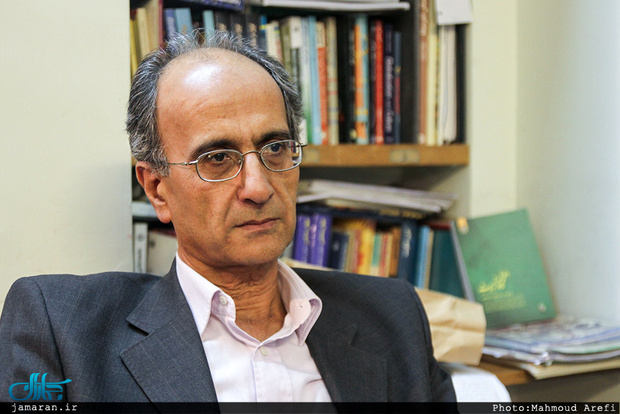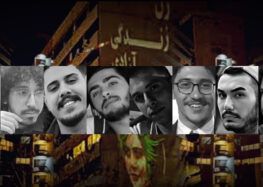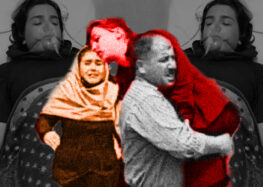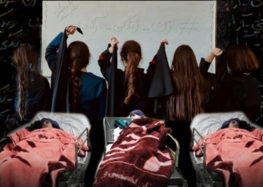MP: “More Details Necessary” To Determine Cause of Iranian-Canadian’s Death in Custody

Tehran Prosecutor Claims Autopsy Conducted But Still No Medical Examiner’s Report
Iran’s deputy parliamentary speaker has stated that, based on a video produced by the Islamic Revolutionary Guards Corps (IRGC), it’s not clear whether Iranian-Canadian academic Kavous Seyed-Emami committed suicide in Tehran’s Evin Prison on February 9, 2018, as officials have claimed.
Tehran Prosecutor Abbas Jafari Dowlatabadi told reporters on February 13 than an autopsy was conducted on Seyed-Emami’s body before it was delivered to the family on February 13, but no medical examiner’s report has been released to the public. Seyed-Emami was buried on in Amaneh Cemetery near Tehran on February 13.
A source with knowledge about the case told the Center for Human Rights in Iran (CHRI) on February 12 that his family had requested an autopsy to determine the cause of death after seeing the film provided by the IRGC.
“We didn’t see the act of suicide in the 2-3 hour film [from inside his cell],” said the source, who requested anonymity for security reasons. “We are hoping that the investigation will clarify why he was detained and interrogated.”
It is unknown whether the family has received a medical examiner’s report.
An Iranian-Canadian dual national, Seyed-Emami, 63, was the managing director of the Persian Heritage Wildlife Foundation (PHWF) and taught sociology at Tehran’s Imam Sadeq University. He was arrested on January 24 and his wife was told he committed suicide in Evin Prison on February 9. Officials also claimed that two other detainees (one in Tehran and one in Arak) committed suicide in late December and early January respectively.
MPs React to IRGC Film of Seyed-Emami’s Last Moments
On February 12, the IRGC asked for a meeting with an unknown number of members of Parliament (MPs) to show them a film of Seyed-Emami’s last moments.
After viewing the film, Deputy Parliamentary Speaker Ali Motahhari said he did not see the moment of the suicide but did not discount the possibility that Seyed-Emami had killed himself. Motahari added that “more details are necessary” to determine the cause of death.
“The moment of suicide is not clear in this film,” the conservative MP told the semi-official Iranian Labor News Agency (ILNA) on February 12. But for seven or eight minutes, he was doing things that could possibly suggest he had the intention to commit suicide.”
“It is obvious that the [camera] operator did not notice it,” added Motahari. “He should have noticed and stopped it. It appears there has been a failure in this regard and they, too, accept this.”
He continued: “I believe the explanations regarding the death of Mr. Seyed-Emami’s death are insufficient and more details are necessary to clarify all aspects of this case.”
The family’s lawyer in Tehran told a reporter that the film did not show Seyed-Emami committing suicide.
“I just spoke to Mr. Kavous Seyed-Emami’s lawyer. There’s no clear sign in the film that he committed suicide,” Shargh newspaper reporter Amene Shirafkan tweeted on February 12.
Reformist MP Mohammad Reza Tabesh said that the circumstances surrounding Seyed-Emami’s death have aroused suspicions.
“The arrest of a group of environmental activists and holding them for more than 20 days have raised some suspicions,” Tabesh told the semi-official Iranian Students News Agency (ISNA) on February 11.
“The death of a well-respected sociologist like Dr. Seyed-Emami is unfortunate and raises questions about the accusations leveled against the detainees… They are not political activists and did not have access to classified information,” he added.
Parvaneh Salahshouri, the leader of the Parliament’s reformist Women’s Faction, also stated that the judiciary should investigate the death.
“As the authority directly responsible for the death of Professor Seyed-Emami, the judiciary is expected to investigate the various aspects of this suspicious death as soon as possible,” she said in an open parliamentary session on February 11.
But some MPs said they felt convinced by the film that Seyed-Emami had killed himself.
Hossein Naghavi, the conservative spokesman for the Parliamentary Committee for National Security Affairs, told ISNA that the film presented by the IRGC showed Seyed-Emami placing pillows under the blanket to trick guards into thinking that he was sleeping before he hung himself.
Seyed-Emami is the second Iranian-Canadian who has died in custody in Iran. In July 2003, photographer Zahra Kazemi also died under suspicious circumstances while being interrogated in Evin Prison. Her case remains unsolved despite calls for justice by lawyers and Canadian officials.
Mostafa Tajzadeh, an adviser (2004-05) to former President Mohammad Khatami (1997-2005), tweeted on February 10 that President Hassan Rouhani should demand an investigation “so that the truth about Dr. Seyed-Emami becomes clear for the public.” Although his demand was never met, Khatami called for an investigation after Kazemi died.
Officials Accuse NGO Workers of Espionage
A number of other current and former PHWF staff members were also arrested between January 24 and 25. Officials have accused them of engaging in espionage.
The secretary of Iran’s Supreme National Security Council said on February 11 that non-governmental organizations (NGOs) working in the fields of health, women’s issues and the environment were being investigated, alleging they’re operating under a “cloud of ambiguity.”
In his comments to the press, the Tehran prosecutor claimed Seyed-Emami and the remaining detainees were carrying out an elaborate “mission” directed by the US and Israel.
“On January 9, 2018, based on a report by one of the security organizations sent to the Shahid Moghaddas Court… it was determined that the suspects were directed by CIA and Mossad intelligence officers to carry out a three-pronged mission in environmental issues, penetration into Iran’s scientific community and gathering information from sensitive and vital places in the country, including missile bases,” said Dowlatabadi.
On February 11, Dowlatabadi had claimed that Seyed-Emami “knew that many had confessed against him and he himself had made some confessions, too. But unfortunately, he committed suicide.”
Dowlatabadi added that Seyed-Emami was one of several former and current PHWF staff members arrested for “espionage under the guise of research.”
On February 11, the Fars News Agency, which is affiliated with the IRGC, published a report with the headline, “Details of a suspected spy’s suicide in prison,” claiming that Seyed-Emami “admitted handing over a large volume of classified information to foreign intelligence services.”






